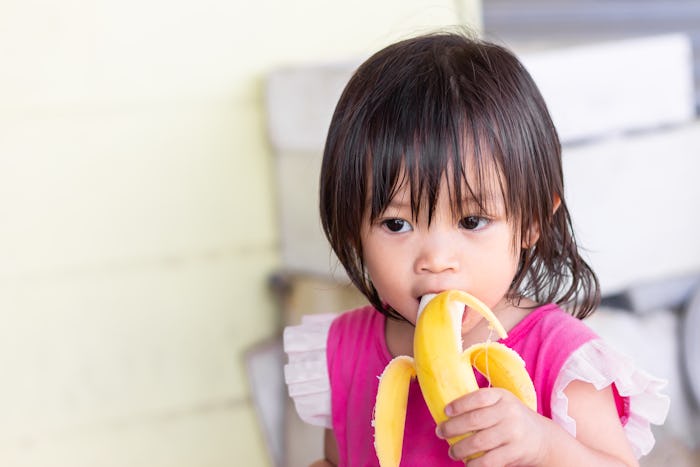Toddlers

Here's Why Your Toddler Loves Bananas So Much (For Now)
Mushy, sweet, and easy to hang onto while running all over your house — it's no wonder they're a toddler fave.
One of the first whole foods I ever gave my oldest son was a banana. He gobbled it right up and has seemingly been on a banana kick every since. Especially as a toddler, bananas were his go-to snack, and I know I wasn't the only toddler-mom buying a bunch of bananas twice a week. But why do toddlers love bananas so dang much? I think every parent has a certified "nana" lover on their hands.
"Toddlers likely enjoy bananas because they are sweet and fun and easy finger foods," Dr. Sarah Schaffer DeRoo a pediatrician with Children's National Hospital tells Romper. Toddlers are also constantly on the move, so it makes sense that they would love food that is easy to hang onto while they explore. A banana just checks all of the boxes for toddlers. They're sweet, easy to hold, easy to chew, and nutritious. Not to mention, they're also familiar. Because so many parents feed toddlers bananas from an early age, the familiarity of their mushy texture and fruity taste makes them extra appealing for toddlers who tend to be picky eaters by nature.
Not only do they tickle a toddler's tastebuds, but the nutritional benefits of bananas are also right on target for their needs. "Bananas are full of fiber, vitamins, and micronutrients — plus have a subtle sweetness that kids enjoy," pediatrician Dr. Natasha Burgert tells Romper.
Burgert says that although she doesn't typically hear about toddlers in her practice having a strong preference for bananas, that "toddlers will prefer food items they are most often offered."
When it came time to introduce my oldest to solid foods, fruits, and veggies, a banana was easy enough to mash up with a fork and give him a spoonful of without too much prep work or thought. "A banana is a great first food because it is inexpensive, readily available, and easy to prepare for a baby who has few, if any, teeth," Schaffer DeRoo says. "Children are unlikely to have a food allergy in response to bananas, making it an attractive early food."
Additionally, Burgert explains that parents who are interested in introducing their children to foods with a potential allergen can use bananas as a vehicle to do so. "Updated recommendations encourage parents to offer a wide variety of foods to infants. There is no 'best' first food. Bananas, however, are simple to mash or blend in order to offer a quick food in a safe way" she suggests. "Bananas are also very tasty when blended with a small amount of creamy peanut butter, allowing a first food to also provide protection against food allergy."
Now an 8-year-old with an appetite that just won't quit, my oldest son is still a banana-loving guy who will grab a yellow crescent-shaped fruit over most others when he wants a quick snack. "A benefit of eating bananas is that they contribute to a child’s daily servings of fruits and are a healthy snack choice," Schaffer DeRoo tells Romper.
When faced with the choice of a bag of chips or a banana, I'm happy to report that, just like he did as a toddler, my son will gladly reach for a banana. Maybe it's more of a habit than anything, but I'm definitely not complaining.
Experts:
Natasha Burgert, MD, FAAP, pediatrician in South Overland Park, KS
Sarah Schaffer DeRoo, MD, pediatrician at Children's National Hospital